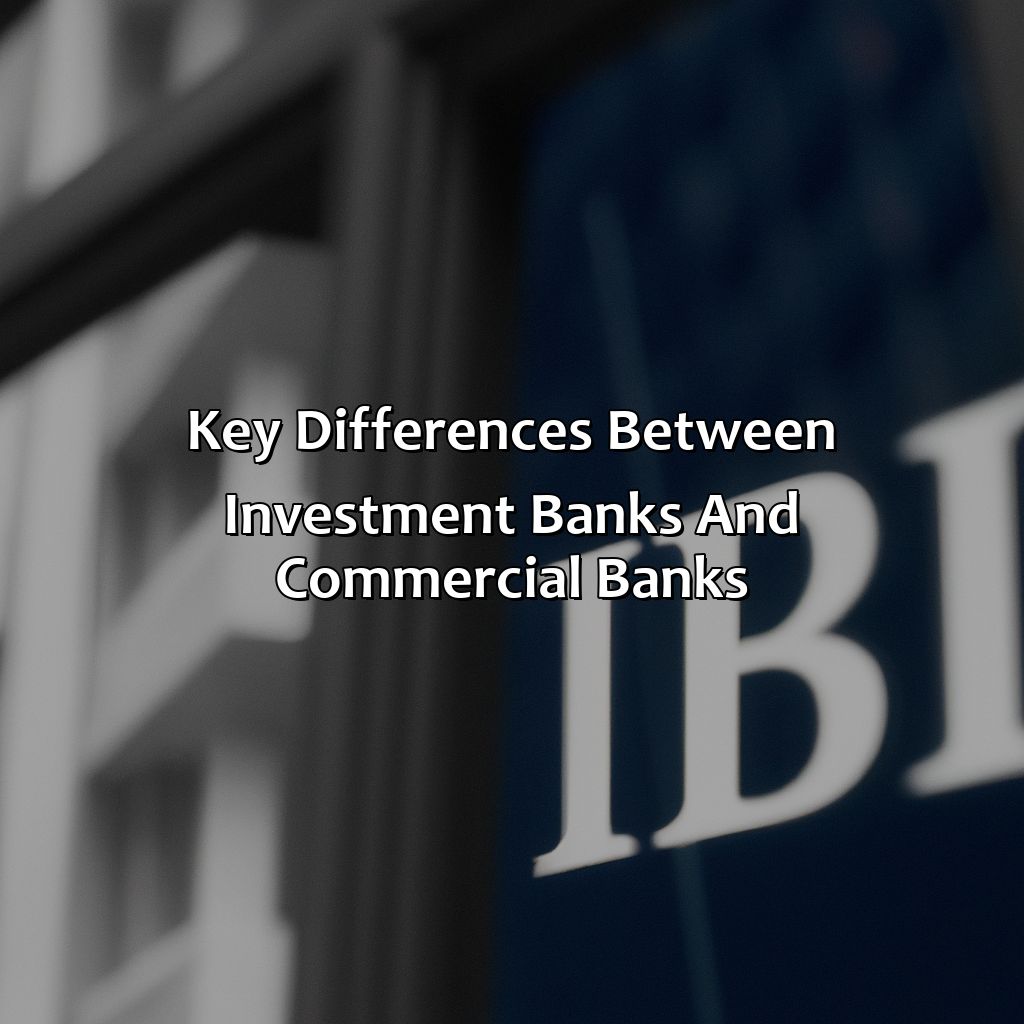How Do Investment Banks Differ From Commercial Banks?
Key Takeaway:
- Investment banks offer specialized financial services such as underwriting securities, mergers and acquisitions advice, and asset management to corporations, governments, and high net worth individuals.
- Commercial banks, on the other hand, offer traditional banking services such as deposits, loans, and other financial products to individuals and small to medium enterprises. They also handle retail banking including credit cards and checking accounts.
- The key differences between investment banks and commercial banks are their business model and operations, regulatory environment, risk appetite and management, and fee structure. Investment banks primarily earn revenue through fees and commissions, while commercial banks earn interest income and fees on the products they offer.
Struggling to understand the difference between investment banks and commercial banks? You are not alone. This article provides insight into the key differences between the two banking sectors, helping you make an informed decision.
Investment Banks
Gaining an in-depth understanding of investment banks requires you to know about the services they provide and the types of clients they cater to. Services and clients are two essential features when it comes to investment banks. This article segment is dedicated to “Investment Banks” with “Services Offered by Investment Banks, Clients of Investment Banks” as subsections. This will help you gain a better understanding of these aspects.

Image credits: retiregenz.com by David Jones
Services Offered by Investment Banks
Investment banks provide a range of specialized services beyond traditional deposit-taking and lending activities. These services might include underwriting, M&A advisory, asset management, trading in securities, and raising capital. Investment banks essentially help businesses navigate the complex world of finance to grow and succeed financially.
Who needs friends when you have investment bankers? They’ll always have your back…as long as you have millions to invest.
Clients of Investment Banks
Investment banks attract a diverse array of clients seeking specialized financial services. Here are five groups of individuals and institutions that often work with investment banks:
- Hedge funds: These entities rely on investment banks for trade execution and financing.
- Corporations: Firms may tap investment banks to help them raise capital through IPOs or other public offerings.
- Ultra-high net worth individuals: The very wealthy often use bespoke Investment banking advice to manage their portfolios and investments.
- Governments and government agencies: State treasuries can use Investment Banks to help finance projects or manage sovereign debt in the bond market.
- Closed-end investment vehicles like private equity, real estate funds, high-yield bond funds, etc. Often form partnerships with Investment Banks.
One noteworthy detail about Investment Banks is that they often engage in risky/high-reward business activities that can result in significant gains and losses. They utilise various strategies such as underwriting new securities for corporations as well as proprietary trading desks.
A colleague once told me how an Investment Bank helped his company with a giant acquisition by using complex financial modelling techniques that impressed him beyond measure. The bank was able to secure financing at seemingly impossible terms, which allowed his company to achieve its goal without overstretching capital resources.
Why settle for a measly savings account when you can invest in an investment bank and watch your money do the cha-cha on Wall Street?
Commercial Banks
To comprehend commercial banks and investment banks, explore their operations. Commercial banks provide different services and serve distinctive customers, compared to investment banks.

Image credits: retiregenz.com by Joel Arnold
Services Offered by Commercial Banks
Commercial Banks facilitate various types of financial services for individuals and businesses, such as deposits, loans, credit cards, and insurance products. They are crucial in supporting the economy and play a vital role in providing financial stability. Commercial banks also offer foreign exchange services and act as intermediaries between borrowers and lenders. Through their ATMs, digital platforms, mobile applications, and other banking channels, they provide convenient access to their services around the clock.
Moreover, commercial banks also engage in treasury management activities that aim to manage risk exposure for clients by investing their money in diverse investment portfolios. They offer different types of savings accounts, deposit certificates (CDs), and money market funds that suit a client’s needs according to their preferences. These activities support customers while saving them costs associated with private transactions.
In addition to these services offered by commercial banks, they provide safety deposit boxes to clients for storage purposes like jewelry or important documents. This arrangement ensures maximum security from theft or fire hazards.
As suggested in this article section’s heading “how do investment banks differ from commercial banks?”, customers interested in investments can seek financial advice from investment bankers since commercial banks usually focus mainly on traditional banking activities. By contrast, investment banking firms primarily assist individuals or companies raise capital by managing initial public offerings (IPOs), mergers & acquisition (M&As), offers debt securities underwriting or trading shares on behalf of investors through proprietary trading desks.
To maximize the benefits of commercial bank offerings at optimal rates it is advisable to maintain an excellent credit score and monitor account activity frequently. With diligent attention fostering a healthy relationship with commercial banks could lead to additional perks such as waived fees or favorable lending terms due to volume business affiliates have conducted with the bank over time.
Commercial banks: where your money goes to work harder than you ever will.
Clients of Commercial Banks
Banks’ Diverse Range of Customers
Various individuals and businesses are clients of commercial banks, seeking different products to match their goals. Commercial banks cater to:
- Retail customers for savings accounts and loans
- Medium-sized enterprises for complex financial transactions and credit lines
- Large corporations requiring investment opportunities.
Commercial banks also offer foreign exchange services to customers involved in international trade. In addition, they provide cash management services to help organizations streamline their finances by processing payments efficiently.
The following table shows different categories and their description of customers of commercial banks:
| Category | Description |
|---|---|
| Retail Clients | Savings accounts, term deposits, personal loans |
| Small-medium sized businesses | Credit cards, equipment financing, commercial mortgages |
| Large corporations | Capital management services, investment banking services |
One significant phenomenon that occurred in recent times was the digitization of banking services. From depositing checks remotely via mobile devices to completely web-based banking systems, these technological advancements have transformed the banking industry.
In its initial stages established around 1782 under Bank of North America later, came being known as The First Bank of US functioning from 1791-1811 managed by Alexander Hamilton. Think of investment banks like adrenaline junkies, while commercial banks are more like cautious penny-pinchers.
Key Differences between Investment Banks and Commercial Banks
Investment banks and commercial banks differ in terms of business model, operations, regulation, risk appetite, management, and fee structure. Let’s explore each of these. The unique features of investment banks and commercial banks are important for understanding how they approach various factors that shape their expectations and outcomes.

Image credits: retiregenz.com by Joel Woodhock
Business Model and Operations
The functional approach and structure of Investment Banks and Commercial Banks distinguish the workings of these two models. Investment Banks operate with a focus on capital markets by connecting firms to investors on a large scale. They offer services in areas such as asset management, mergers and acquisitions, securities trading, among others. On the other hand, Commercial Banks engage majorly in deposit-taking activities from individuals and businesses while providing various loans products such as personal loans, business loans and mortgage loans to their customers.
Furthermore, the business model of Investment Banks distinguishes itself from that of Commercial Banks based on their operations as well. The main focus of investment banks is on underwriting new securities like bonds and stocks for clients who require financing or additional funds through the capital market channeling which makes it easier to reach a wider audience base. They also provide consultations to their clients looking for financing by advising them accordingly while bearing in mind their profit intentions. However, commercial banks primarily aim at managing deposit account functions and invest heavily in personal banking amenities such as bank-like credit cards’ benefits, debit cards’ facilities white checking accounts for those who desire financial security.
Investment banks typically lend to corporations disregarding some requirements set out by other regulatory bodies compared to commercial banks whose requirements are higher due to their accountability policies. One true life example that illustrates the differences between these two types of financial institutions is when an individual has a huge cash inflow flow from shares after successful trading on international market channels; investment banks may entertain offers like lending them highly without much scrutiny compared to Commercial BankLeveraging regulations that would restrict investments made with such funds borrowed from retail investors with less stringent measures.
Regulations are like training wheels for banks, except they never come off and the bike is still wobbly.
Regulatory Environment
The compliance landscape differs significantly between investment banks and commercial banks, with the former functioning in a more segregated regulatory environment. While commercial banking is subject to strict regulations such as the Dodd-Frank Act and Basel III, investment banking is governed by various regulations including the US Securities Act of 1933, The Investment Company Act of 1940, and The Investment Advisers Act of 1940.
Investment banks must adhere to a plethora of rules concerning institutional investor protections, insider trading, corporate governance and fiduciary duties. Nevertheless, it also gives them greater freedom when it comes to trading activities than commercial banks.
In contrast, Commercial Banks are authorized under federal legislation like the Bank Holding Company Act of 1956 and are supervised by government regulatory authorities like the Federal Reserve Board (FRB) primarily focused on ensuring consumer protection while also carrying out traditional financial dealings.
Notably, commercial banks accept deposits from individuals and businesses while offering other services such as loans for mortgages or credit cards. On the other hand, investment banks work primarily with large-scale companies regarding capital raising needs or issuance & public offerings to raise their shareholder price points.
According to Refinitiv’s report dated January 2021 known as ‘Investment Banking: Global Q4 2020 Review,’ Goldman Sachs dominates in mergers and acquisitions deals in terms of money made globally for full-year across all industries.
Why have a risk appetite when you can have a feast? Investment banks love to indulge while commercial banks stick to a strict diet.
Risk Appetite and Management
Investment banks operate under a distinct risk appetite compared to commercial banks due to their nature and clientele. Investment banks tend to have a higher tolerance for risk as they deal with sophisticated investors and complex financial instruments. Their risk management strategies are tuned towards hedging, diversification and advanced market analysis techniques.
In addition, investment banks are equipped with elaborate risk management systems that encompass various factors such as credit, market, liquidity and operational risks. These systems are designed to facilitate trading activities while minimizing potential losses and identifying new opportunities.
It is worth noting that investment banks may face more severe consequences due to their higher stake in the market, which can impact not just themselves but also the broader financial industry. Therefore, a crucial aspect of investment banking is staying ahead of regulatory requirements and maintaining compliance.
During the 2008 financial crisis, many investment banks faced significant losses due to unsustainable investments like subprime loans that were less regulated at that time. This resulted in stricter regulations being imposed on these institutions globally.
This demonstrates the critical importance of appropriately managing risk appetite within investment banking circles and underlines how essential sound risk management is for sustaining profitability in a volatile financial environment.
Why pay for a full meal at a commercial bank when you can just order a la carte at an investment bank’s fee structure?
Fee Structure
The Investment Bank and Commercial Bank differ in their approach to charging for services. Banks levied compensation for all functioning under service contracts.
The Fee Structure of Investment Banks and Commercial Banks is vastly different. Below is the table giving insight into the actual data on this:
| Type of Fee | Investment Bank | Commercial Bank |
|---|---|---|
| Advisory Fees | 3-10% | Not Applicable |
| Underwriting Fees | 1-5% | Not Applicable |
| Interest Rates Charged to Borrowers/Public | Higher | Lower |
One unique offering by an investment bank is the Advisory fees, where they charge a fee for providing financial advice regarding mergers and acquisitions, restructuring or other transactions.
It’s been said that the Investment Banking industry has roots extending further back than all modern commercial activities, originating in Europe when wealthy institutions needed help managing their large sums of money.
Five Facts About How Investment Banks Differ From Commercial Banks:
Investment banks focus on financial services for corporations, while commercial banks serve individuals and small businesses. (Source: The Balance)
Investment banks underwrite securities offerings, while commercial banks provide loans and mortgages. (Source: Investopedia)
Investment banks specialize in trading and brokerage services, while commercial banks focus on deposit-taking and lending. (Source: Corporate Finance Institute)
Investment banks often work with high-net-worth individuals and institutional investors, while commercial banks serve a broader range of customers. (Source: The Wall Street Journal)
Investment banks typically earn higher fees for their services compared to commercial banks. (Source: Forbes)
FAQs about How Do Investment Banks Differ From Commercial Banks?
How do investment banks differ from commercial banks?
Investment banks are different from commercial banks in various ways. Investment banks deal with the capital markets, offering services such as underwriting, M&A advisory, and securities trading. Meanwhile, commercial banks offer standard banking services such as checking accounts, loans, and personal banking to their customers.
Can investment banks offer deposits?
No, investment banks do not typically offer deposits. They are not authorized to take personal deposits, unlike commercial banks that require deposits from customers. Investment banks’ primary role is to offer services related to capital markets.
What are some of the services offered by investment banks?
Investment banks offer various services, including underwriting equity and debt securities, assisting companies in mergers and acquisitions, providing research and broker-dealer services, and managing assets for high net worth individuals and institutional investors.
What are the risks associated with investment banking?
Investment banking involves taking risks as the services offered revolve around the capital markets. Banks must ensure that proper due diligence is carried out before offering services. There is a risk of litigation if investments go wrong, and a bank may experience major losses if a major downturn happens in the market.
Can an individual bank with an investment bank?
No, investment banks generally do not offer banking services to individual customers. They mainly deal with institutional investors, corporations, and governments. Investment management services, however, can be availed by high net worth individuals.
Are investment banks regulated?
Yes, investment banks are regulated by government agencies and required to comply with rules to ensure transparency and accountability. Regulators such as the SEC and FINRA in the US and Financial Conduct Authority in the UK are in place to oversee investment banking operations and regulate the industry.
 Checkout this IRS Loophole
Checkout this IRS Loophole 
